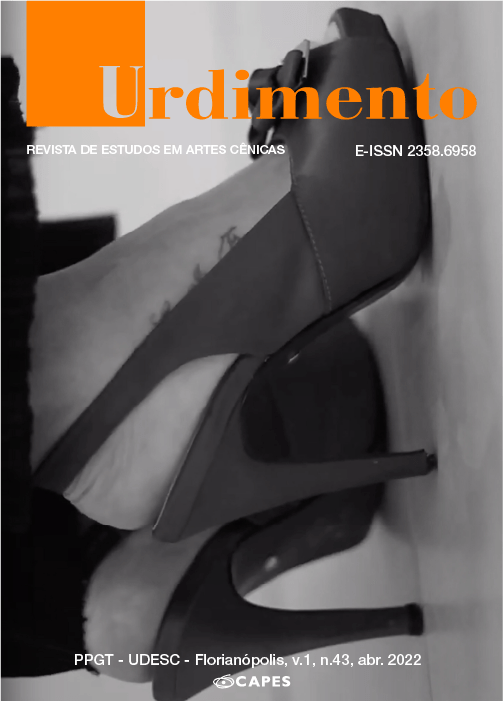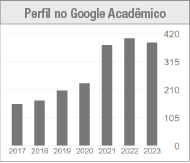Notes on the concept of representativeness
DOI:
https://doi.org/10.5965/1414573101432022e0206Keywords:
Representativeness., Representation, Ethics, Contemporary scene, DiversityAbstract
Considering the emerging of a new movement that advocates for self-representation in the arts, this article brings some reflections on the ethical, aesthetic, political and social implications that permeate the representation of minority social groups in contemporary theater. Starting from the construction of an understanding of the concept of representativeness within the Brazilian performing arts field and an analysis of some ways it can operate in and out of theater, the article also presents proposals for artists who aim to create under a representative, plural and emancipatory perspective.
Downloads
References
BOBBIO, Norberto; MATTEUCCI, Nicola; PASQUINO, Gianfranco. Dicionário de política I. Brasília: Editora Universidade de Brasília, 1 ed., 1998.
BORGES, Rosane. Das perspectivas que inauguram novas visadas. In: HOOKS, bell. Olhares negros: raça e representação. São Paulo: Elefante, 2019.
BUTLER, Judith. A força da não violência: um vínculo ético-político. São Paulo: Boitempo, 2021.
CORNAGO, Óscar. Cuerpos, política y sociedad: una cuestión de ética. In: Éticas del cuerpo. DOMÍNGUEZ, Juan; GALÁN, Marta; RENJIFO, Fernando. Madrid: Fundamentos, 2008.
DESS, Conrado. Para se pensar uma representatividade negra: reflexões sobre o corpo (não) negro nas artes cênicas. Urdimento - Revista de Estudos em Artes Cênicas, Florianópolis, v. 3, n. 39, p. 1-21, 2020.
DOI: 10.5965/14145731033920200204.
DIÉGUEZ CABALLERO, Ileana. Cenários liminares (teatralidades, performances e políticas). Uberlândia: EDUFU, 2016.
FÉRAL, Josette. Além dos limites: teoria e prática do teatro. São Paulo: Perspectiva, 2015.
FOUCAULT, Michel. Vigiar e punir. Petrópolis: Vozes, 1987.
LEAR, Jonathan. Radical hope: ethics in the face of cultural devastation. Massachusetts: Harvard University Press, 2006.
LEHMANN, Hans-Thies. O teatro pós-dramático. São Paulo: Cosac Naify: 2008.
RANCIÈRE, Jacques. O Espectador Emancipado. São Paulo: Editora WMF Martins Fontes, 2012.
SAISON, Maryvonne. Les théâtres du réel. Paris: L’Harmatan, 1998.
SÁNCHEZ, José A. Practising the real on the contemporary stage. Bristol: Intellect, 2014.
SÁNCHEZ, José A. Cuerpos ajenos. Segovia: Ediciones La uÑa RoTa, 2017.
SIQUEIRA, Indianare. Por que transvestigênere? Indianara explica! Facebook, 2015. Disponível em:
https://www.facebook.com/PreparaNem/posts/1698719687008538.
Acesso em: 02 abr. 2021.
SODRÉ, Muniz. Por um conceito de minoria. In: PAIVA, Raquel; BARBALHO, Alexandre (Org.). Comunicação e cultura das minorias. São Paulo: Paulus, 2005. p. 11-14.
SPIVAK, Gayatri Chakravorty. The post-colonial Critic: interviews, strategies, dialogues. New York: Routledge, 1990.
SPIVAK, Gayatri Chakravorty. Foreword: Upon Reading the Companion to Postcolonial Studies. In: SCHWARZ, Henry; SANGEETA, Ray (Org.). A Companion to Postcolonial Studies. Oxford: Blackwell, 2000.
SPIVAK, Gayatri Chakravorty. Pode o subalterno falar? Belo Horizonte: Editora UFMG, 2010.
Published
How to Cite
Issue
Section
License
Copyright (c) 2022 Urdimento - Revista de Estudos em Artes Cênicas

This work is licensed under a Creative Commons Attribution 4.0 International License.
Copyright Statement
The articles published by the magazine are free to use. The copyright is all assigned to the magazine. The articles whose authors are identified represent the expression from the point of view of their authors and not the official position of the journal Urdimento. The author (s) undertakes whenever publishing material relating to the article published in Revista Urdimento mention the said publication as follows: This article was originally published by Urdimento magazine in its volume (put the volume), number (put the number) in the year of (put the year) and can be accessed at:
http://www.revistas.udesc.br/index.php/urdimento
This work is licensed under a Creative Commons Attribution 4.0 International License.




